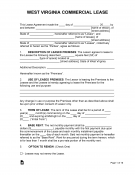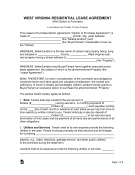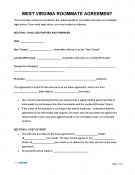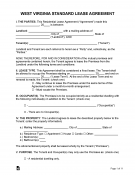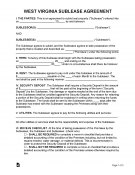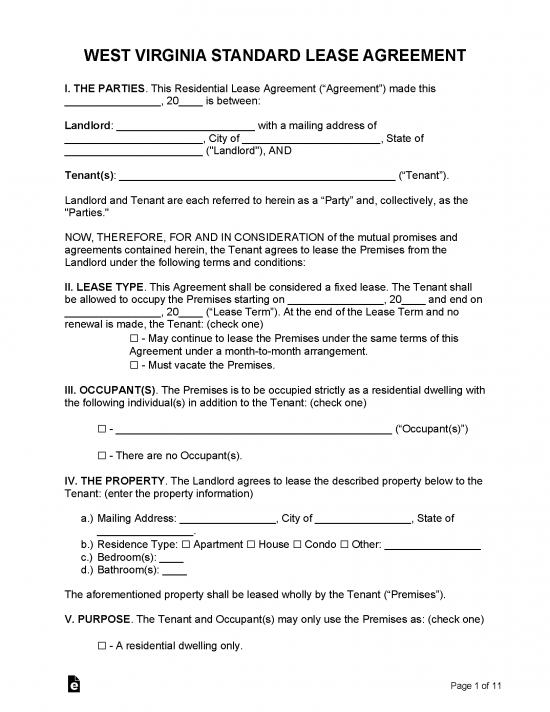West Virginia lease agreements allow landlords and tenants to set binding terms for the lease of a property. The agreement should name the expected monthly rent, assign responsibility for utilities, and contain property policies, such as whether pets are permitted. Both parties should keep a copy of the agreement, and think of it as the first place to turn when a question arises about their obligations under the lease.
Contents
By Type (6)
- Commercial Lease Agreement
- Month-to-Month Lease Agreement
- Rent-to-Own Lease Agreement
- Roommate Lease Agreement
- Standard Lease Agreement
- Sublease Agreement
Download: Adobe PDF, MS Word, Rich Text Format
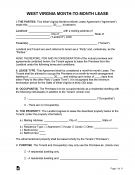 Month-to-Month Lease Agreement
Month-to-Month Lease Agreement
Download: Adobe PDF, MS Word, Rich Text Format
Download: Adobe PDF, MS Word, Rich Text Format
Download: Adobe PDF, MS Word, Rich Text Format
Download: Adobe PDF, MS Word, Rich Text Format
Download: Adobe PDF, MS Word, Rich Text Format
Landlord-Tenant Laws
Statutes – Chapter 37, Article 6 (Landlord and Tenant), Chapter 37, Article 6A (Residential Rental Security Deposits)
Required Disclosures (2)
Lead-Based Paint Disclosure – If a dwelling unit on the property being leased was constructed prior to 1978, then federal law requires the landlord to disclose the hazards of lead-based paints to the tenant.
Non-Refundable Fees – Any fee that a tenant is required to provide to the landlord that is not refundable must be clearly identified in the lease agreement. By definition, security deposits do not include non-refundable fees. (§ 37-6A-1(14))
Security Deposit Laws
Maximum Amount ($)
There is no West Virginia law setting a maximum security deposit amount.
Returning to Tenant
Landlords must return security deposits to tenants within sixty (60) days of the termination of a tenancy or within forty-five (45) days of the occupation of the property by a new tenant, whichever duration is shorter.
A landlord may retain a portion of a security deposit in order to account for unpaid rent, overdue utility bills that the lease agreement made the tenant’s responsibility, repairs to the property other than those needed to fix normal wear-and-tear, and remedying other violations of the lease agreement. The landlord must provide the tenant with a written itemization of any deductions at the same time remaining funds are returned. (In the event that these costs exceed the security deposit, a landlord has an additional fifteen (15) days to provide notice to the tenant.) It is the tenant’s responsibility to provide a new address to the landlord. If the tenant does not, and the itemization/remaining deposit is returned when mailed to the tenant’s last known address, then the landlord must hold it on the tenant’s behalf for an additional six (6) months. (§37-6A-2)
When is Rent Due? (grace period)
Because there is no mandated grace period or set rent date in state statutes, rent is due on the date set in the lease agreement.
Eviction Notice (non-payment)
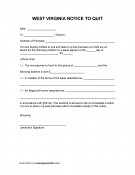 Notice to Pay or Quit – If a tenant fails to pay rent on the day it is due, the landlord or an agent may give this form to the tenant, stating that the landlord has the right to immediately terminate the lease. West Virginia law does not provide for a set number of days that a landlord must wait to begin eviction proceedings after a tenant fails to pay rent and providing a demand for the owed rent. (§ 55-3A-1)
Notice to Pay or Quit – If a tenant fails to pay rent on the day it is due, the landlord or an agent may give this form to the tenant, stating that the landlord has the right to immediately terminate the lease. West Virginia law does not provide for a set number of days that a landlord must wait to begin eviction proceedings after a tenant fails to pay rent and providing a demand for the owed rent. (§ 55-3A-1)
Download: Adobe PDF
Maximum Fees ($)
Late Rent Penalties
Landlords may only impose late fees that are specifically identified in the lease agreement. (§37-6A-2)
NSF Checks
Landlords and other parties who receive payment with a check backed by insufficient funds may impose a fee of $25 if they provide written notice to the tenant alerting him or her to the problem and providing up to ten (10) days to pay the amount owed. (§61-3-39e)
Tenant’s Unclaimed Property
In the case of personal property left behind after a judicial order granting possession to a landlord, such as through an eviction, the landlord should remove and store the personal property. The landlord may dispose of the property after thirty (30) days if the tenant fails to claim the property during that time and either the tenant has failed to pay the landlord for the cost of storage by that time or the cost of storage exceeds the estimated value of the property.
Alternatively, if the landlord has been granted possession and the tenant’s personal property remains on the property, the landlord may also leave it on the property for thirty (30) days and then dispose of it. (§55-3A-3) In the case of personal property left behind after a landlord reasonably believes that the tenant has abandoned the premises, the landlord should also remove and store the property for safekeeping, and should send a written notice to the tenant’s last known address stating that property has been left behind but may be destroyed after thirty (30) days. If the landlord knows or should know that the tenant is on active duty with a branch of the armed forces, then the landlord must wait at least sixty (60) days. (§37-6-6)
